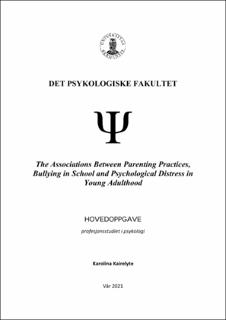| dc.contributor.author | Kairelyte, Karolina | |
| dc.date.accessioned | 2024-01-23T00:38:34Z | |
| dc.date.available | 2024-01-23T00:38:34Z | |
| dc.date.issued | 2021-06-02 | |
| dc.date.submitted | 2021-06-17T22:00:14Z | |
| dc.identifier.uri | https://hdl.handle.net/11250/3113204 | |
| dc.description.abstract | Tidligere forskning har vist at foreldrepraksis og mobbing på skolen hver for seg påvirker psykisk helse. Både foreldrepraksis gjennom oppveksten og mobbing på skolen har vist langvarige konsekvenser for psykisk helse. Spesielt det å bli mobbet på skolen er knyttet til skadelig påvirkning på psykisk helse hos unge voksne. Målet med denne studien er å undersøke om foreldrepraksis og mobbing på skolen kan ha assosiasjoner til hverandre, og har en videre innvirkning på psykiske vansker i ung voksen alder. Resultatene i denne studien er basert på selvrapport fra tverrsnittstudien Studentenes Psykiske Helse Over Tid (n= 2453 gjennomsnittsalder = 23.23 år) i Bergen. Regresjonsanalysene viste at alle foreldrepraksiser og bli mobbet på skolen var assosiert med psykiske vansker hos unge voksne. Mer spesifikt, støttende foreldrepraksis gjennom oppveksten var en beskyttende faktor for senere psykiske vansker, mens aggressiv- og overbeskyttende foreldrepraksiser, og være utsatt for mobbing på skolen, var risikofaktorer for flere psykiske vansker hos unge voksne. I følge medieringsanalysene var det å ha vært mobbet, men ikke å ha mobbet andre, en mediator for forholdet mellom aggressiv- og støttende foreldrepraksis og psykiske vansker hos unge voksne. Denne studien styrker evidensgrunnlaget for at foreldrepraksis gjennom oppveksten har en langtidseffekt på psykisk helse som varer til ung voksen alder, og at en del av denne assosiasjonen kan forklares av å ha opplevd mobbing på grunnskolen. | |
| dc.description.abstract | Previous research has separately linked parenting practices and being involved in bullying to mental health outcomes. Additionally, both are associated with long-term consequences in mental health. Especially being bullied in school is related to adverse impact on mental health in young adults. The aim of this study is to investigate whether parenting practices and bullying in school could be associated, and to examine whether parenting practices and bullying in school have an impact on psychological distress in young adulthood. The results of this study are based on self-report data from the cross-sectional Students´ Psychological Health Over Time-study in Bergen, Norway (n= 2453, mean age= 23.23 years). Regression analyses revealed that all parenting practices and bullying victimization were related to psychological distress in young adulthood. More specifically, supportive parenting was a protective factor for future psychological distress, while aggressive- and overprotective parenting practices, and bullying victimization were risk factors for elevated psychological distress in young adults. Results from mediation analyses suggest that bullying victimization, but not bullying perpetration, mediated the relationship between aggressive-, supportive parenting and psychological distress in young adults. This study strengthens the evidence that parenting practices may have long-term consequences on mental health in young adulthood, and that part of this effect may be explained by bullying victimization during primary and secondary education. | |
| dc.language.iso | nob | |
| dc.publisher | The University of Bergen | |
| dc.rights | Copyright the Author. All rights reserved | |
| dc.title | The Associations Between Parenting Practices, Bullying in School and Psychological Distress in Young Adulthood | |
| dc.type | Master thesis | |
| dc.date.updated | 2021-06-17T22:00:14Z | |
| dc.rights.holder | Copyright the Author. All rights reserved | |
| dc.description.degree | Hovedoppgave psykologprogrammet | |
| dc.description.localcode | PROPSY317 | |
| dc.description.localcode | PRPSYK | |
| dc.subject.nus | 736102 | |
| fs.subjectcode | PROPSY317 | |
| fs.unitcode | 17-0-0 | |
